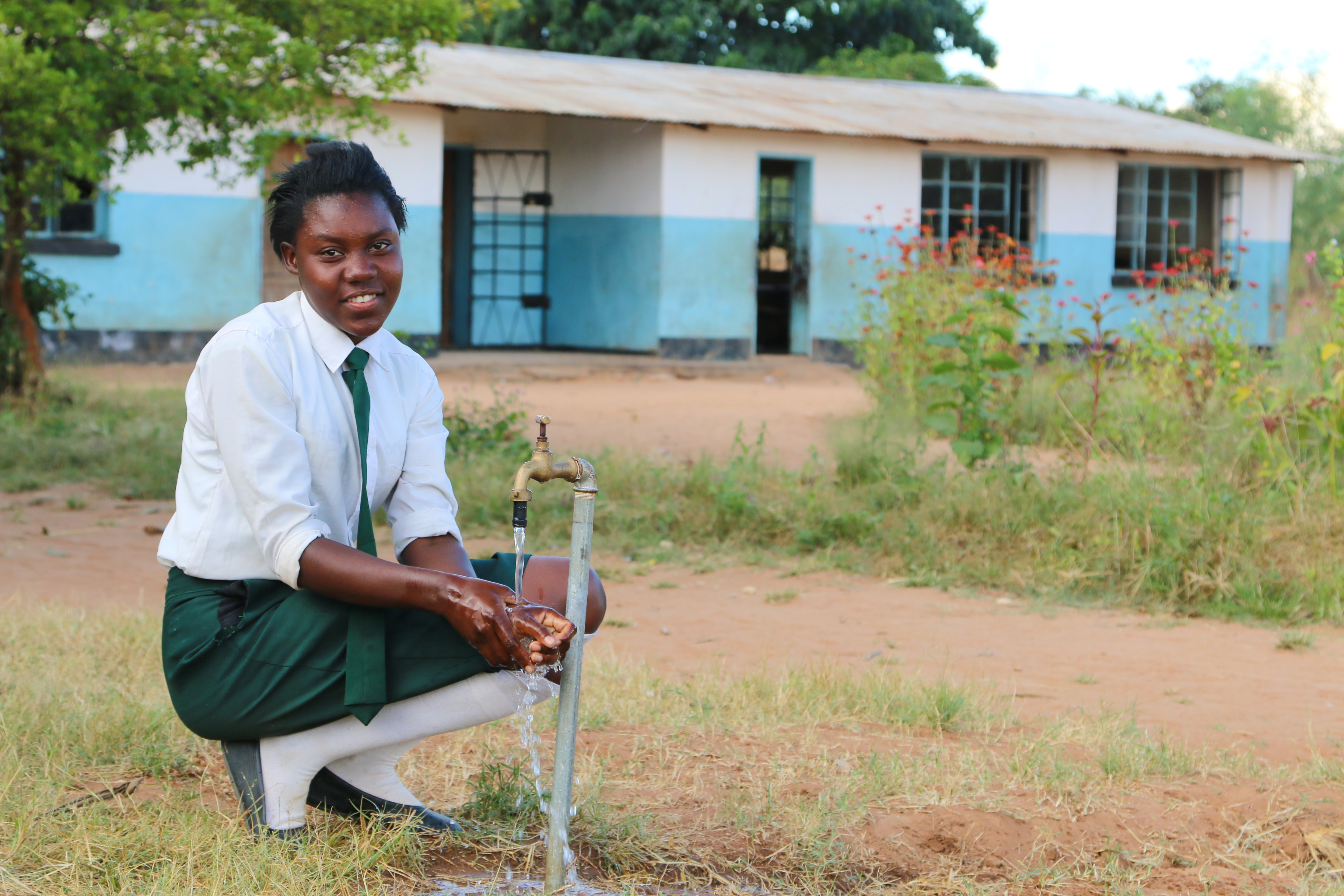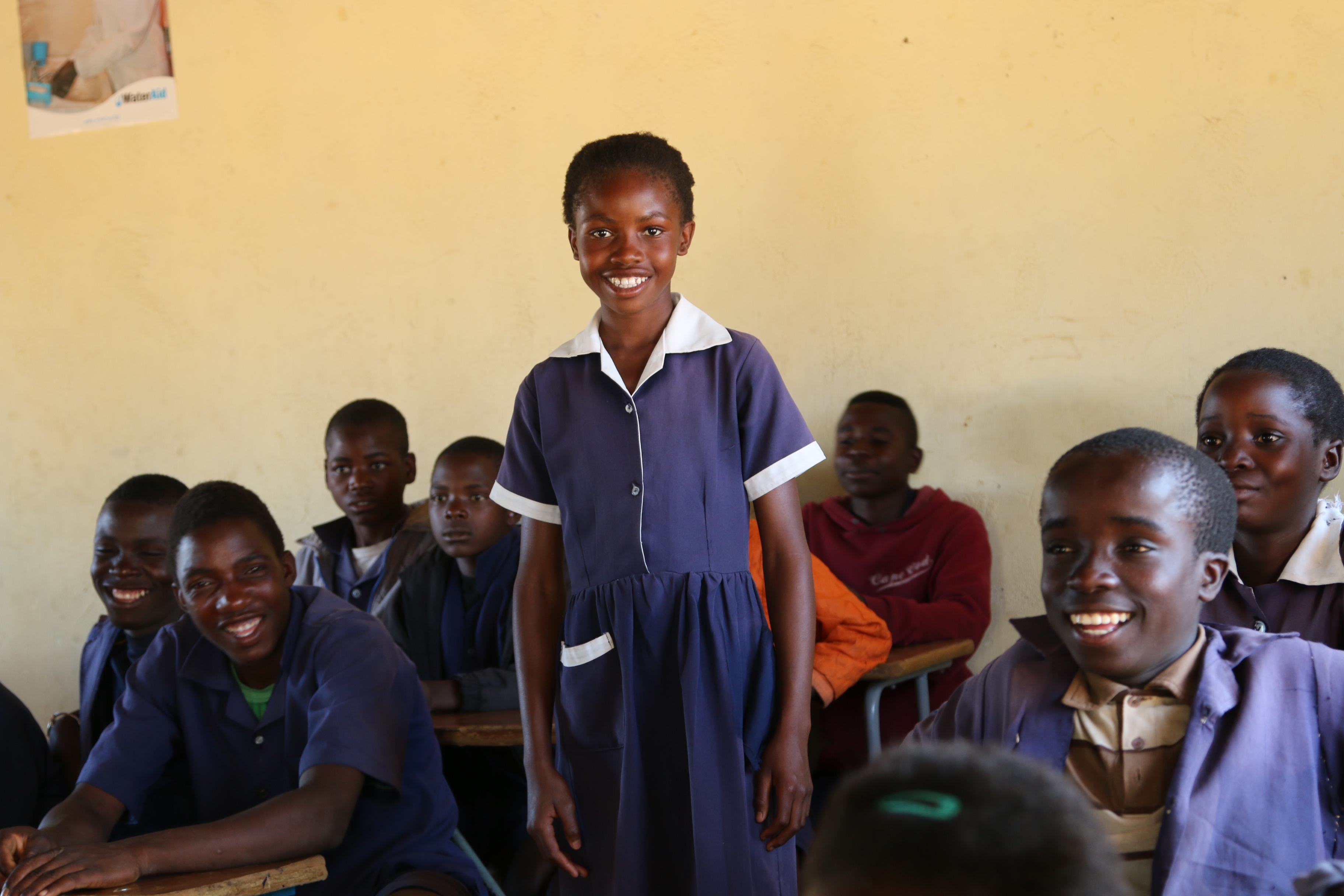Photo: WaterAid / Chileshe Chanda
You cannot cook, you are unhygienic.
You cannot pray, the gods will not hear you.
You cannot sleep in the house, you are impure.
These are some period taboos around the world that demonstrate the deep rooted, gendered power dynamics embedded within menstrual norms. Not being able to manage your period safely and with dignity is a complex and global human rights issue that demands our attention.
International Definitions
Menstrual Hygiene Management (MHM) is vital aspect of every woman’s life and it defines the practice of being able to manage your period safely. Unicef and the World Health Organisation defined MHM in 2014 as the use of clean material to absorb or collect blood, which can be changed privately as often as necessary, being able to use soap and water for washing and access to disposal. While this definition covers the practical resource and water, sanitation and hygiene (WASH) needs for MHM, it does not focus on the need to address underlying educational challenges and stigmas that perpetuate period poverty. We advocate for an approach that incorporates both gender sensitive WASH facilities and addresses negative gender norms. Through this, we can accelerate our progress towards reaching the SDGs.
It’s human rights Issue
Despite progress in international definitions, the reality is that many women and girls across the world lack access to adequate resources and WASH facilities to manage their menstrual health safely. Many women and girls use unhygienic menstrual management materials, which can cause health issues, and often, public spaces such as schools lack adequate latrines and gender sensitive WASH facilities. The negative impact of this on girls’ ability to participate in their education demonstrates how MHM is a global human rights issue, deeply connected to cross-cutting development issues. Period poverty has negative impacts on health, education, gender equality, productivity and if not addressed perpetuates existing inequalities. No girl should have to miss school or at worst drop out due to a lack of access to sanitary materials or adequate WASH facilities that allow for safe and dignified menstrual management.
MHM, period poverty and education in Zambia
In 2018 Zambia had a projected population of around 16,887,720 million people; women represent 51% of this population. Despite SDG 6.2 requiring countries to pay special attention to women and vulnerable groups, in Zambia there is a lack of strong national guidelines for MHM. However, MHM has been looked at within the education sector in Zambia.
According to the Ministry of General Education, the ability of women and girls to manage their periods is affected by a plurality of factors such as knowledge and beliefs about menstruation, access to affordable and hygienic sanitary materials and disposal options. If these elements are not adequately addressed, it often results in many women and girls managing their menstruation in unsanitary ways. In some rural areas within Zambia, women and girls use a ‘traditional pad’, which uses cow dung as the absorbent material. In other instances, girls have sat on sand piles during their menses as they do not have access to affordable sanitary materials.
Furthermore, research conducted in 2015 by the Ministry of General Education showed that girls had restrictions placed on them during their periods such as not playing with males, not being able to cook as well as restrictions on movement including not attending school in some cases.

The impact of this on female education is huge. In 2010, The Educational Statistical Bulletin reported that the percentage of girls between grades 1-9 that drop out of school is estimated at 2.71%, while the dropout rate of boys in the same grades is estimated at 1.88%. These statistics show how secondary school completion rates are higher for boys than girls and this has been linked to ineffective menstrual management and stigmas that still surround menstruation. It was thought that many girls decide not to go to school when they are menstruating for various reasons including fear of being embarrassed if or when they soil their clothes, lack of adequate and appropriate sanitary materials and lack of adequate WASH facilities.
Since 2010, increased interest, investment and stakeholder involvement have shaped the conversation around menstrual hygiene in schools. In 2012, a technical working group chaired by the Ministry of Education was set up with a variety of stakeholders including NGOs and cooperating partners. The aim of this group was to mobilise resources for MHM, provide technical support to national interventions; coordinate MHM interventions and research in schools; and to develop knowledge and disseminate best practices.
A study in a number of rural districts in Zambia revealed a lack of knowledge on menstruation among female learners and this situation is often compounded by existing local myths and taboos. This study prompted The Ministry of General Education to launch National MHM guidelines. These guidelines are intended to aid the provision of a supportive school environment that will provide comfort for girls menstruating whilst at school, improve school performances and reduce dropout rates attributable to menstruation.
In 2016, the Educational Statistical Bulletin in Zambia reported that the following progress had been made in schools:
- 45.8% had provided education on menstrual health,
- 24.3% provided sanitary pads for girls,
- 66.5% provided disposal facilities for sanitary pads.
Furthermore, in 2016 the Minister of Finance committed $198,000 to the distribution of free pads in rural and peri-urban schools in 2017. While it has been said at the grassroots level that the Zambian Government has not followed through on their commitments, we do not have any empirical evidence to support this claim.

A holistic way forward
A holistic approach to MHM is needed to ensure all angles of this issue are addressed. Reusable pads are often not affordable for those who need them the most. While there is an increasing proliferation of NGOs and multilateral institutions providing ‘dignity kits’ or ‘comfort kits’, which contain underwear and a supply of sanitary pads, these are often not accessible. In Zambia, the UNHCR have rolled out ‘dignity kits’ containing three pairs of underwear and two reusable pads. At a cost of around $30 per kit, these interventions are not accessible to the most marginalised women and girls. At a slightly cheaper option of $23, Live Well – a social enterprise by CARE – have produced a kit with the same content and quantity. However, this is still too restrictive and falls short by only addressing issues of sanitary materials.
We need affordable or free menstrual products to ensure women and girls can manage their period safely. In schools, access to private and safe places to change sanitary products with WASH and disposal facilities are vital. School environments with safe WASH facilities that are gender and culturally sensitive are essential to enable girls to manage their period with dignity and actively participate in school. Furthermore, education on menstruation will enable girls to better understand the natural changes their bodies go through. To ensure WASH facilities are inclusive and culturally sensitive, women and girls that require these facilities need to be included in the research, design, planning and review of MHM interventions. To achieve effective policies at the national level, women need to be at decision making tables to champion the rights of women and girls in managing their periods with dignity.
This is not a small-scale women’s rights issue, it’s a global human rights issue.